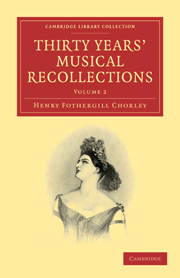Book contents
- Frontmatter
- Contents
- THE YEAR 1847
- THE YEAR 1848 (Her Majesty's Theatre.)
- THE YEAR 1848 (Royal Italian Opera.)
- THE YEAR 1849 (Her Majesty's Theatre.)
- THE YEAR 1849 (Royal Italian Opera.)
- THE YEAR 1850 (Her Majesty's Theatre.)
- THE YEAR 1850 (Royal Italian Opera.)
- THE YEAR 1851 (Her Majesty's Theatre.)
- THE YEAR 1851 (Royal Italian Opera.)
- THE YEAR 1852 (Her Majesty's Theatre.)
- THE YEAR 1852 (Royal Italian Opera.)
- THE YEAR 1853 (Royal Italian Opera.)
- THE YEAR 1854 (Royal Italian Opera)
- THE YEAR 1855 (Royal Italian Opera.)
- THE YEAR 1856 (Her Majesty's Theatre.)
- THE YEAR 1856 (Royal Italian Opera.)
- THE YEAR 1857 (Royal Italian Opera.)
- THE YEAR 1857 (Her Majesty's Theatre.)
- THE YEAR 1858 (Her Majesty's Theatre.—Royal Italian Opera.—Drury Lane.)
- THE YEAR 1859 (Royal Italian Opera.—Drury Lane.)
- The Last Chapter
THE YEAR 1850 (Her Majesty's Theatre.)
Published online by Cambridge University Press: 29 August 2010
- Frontmatter
- Contents
- THE YEAR 1847
- THE YEAR 1848 (Her Majesty's Theatre.)
- THE YEAR 1848 (Royal Italian Opera.)
- THE YEAR 1849 (Her Majesty's Theatre.)
- THE YEAR 1849 (Royal Italian Opera.)
- THE YEAR 1850 (Her Majesty's Theatre.)
- THE YEAR 1850 (Royal Italian Opera.)
- THE YEAR 1851 (Her Majesty's Theatre.)
- THE YEAR 1851 (Royal Italian Opera.)
- THE YEAR 1852 (Her Majesty's Theatre.)
- THE YEAR 1852 (Royal Italian Opera.)
- THE YEAR 1853 (Royal Italian Opera.)
- THE YEAR 1854 (Royal Italian Opera)
- THE YEAR 1855 (Royal Italian Opera.)
- THE YEAR 1856 (Her Majesty's Theatre.)
- THE YEAR 1856 (Royal Italian Opera.)
- THE YEAR 1857 (Royal Italian Opera.)
- THE YEAR 1857 (Her Majesty's Theatre.)
- THE YEAR 1858 (Her Majesty's Theatre.—Royal Italian Opera.—Drury Lane.)
- THE YEAR 1859 (Royal Italian Opera.—Drury Lane.)
- The Last Chapter
Summary
The downward course of Her Majesty's Theatre became more and more evident. Such hope as had been placed in the financial result of Madame Sontag's reappearance, died out.—She was heard with pleasure, but without enthusiasm. To myself, the amount of resource which she displayed, considering her age, seemed then, as now, marvellous,—a feat almost by itself in the history of Opera. But the public did not appreciate this as it deserved. The theatre was falling out of repute, and nothing could save it. None of the new singers excited the slightest sensation.—Signor Baucardé's voice, then very beautiful, already bore traces of ignorant cultivation and misuse.—Mdlle. Parodi continued to try for the succession to Madame Pasta, but in vain.—An English lady, Madame Fiorentini—the Irish lady, Miss Hayes—a French lady, Mdlle. Bertrand (a mezzo-soprano who wished to be a contralto)—had no better fate. There was, in fact, only one event during the season—the production of “La Tempesta,” by MM. Scribe and Halévy.
I have always thought it an unhappy, though not an unnatural idea—that of arranging Shakespeare's “Tempest” in the form of an opera, to be set by Mendelssohn.—The success in faëry-land which he had gained in his “Midsummer Night's Dream” Overture, and which ought to have deterred every one from tempting him to a second enterprise of the kind, was the ground of the mistaken calculation,—a mistake, however, which will be fallen into again and again, so long as the world prefers repetition to novelty.
- Type
- Chapter
- Information
- Thirty Years' Musical Recollections , pp. 111 - 119Publisher: Cambridge University PressPrint publication year: 2009First published in: 1862

